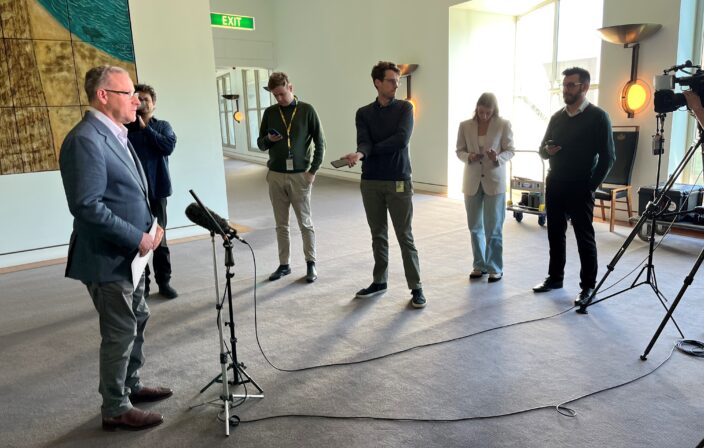Andrew McKellar interview with Greg Jennett, ABC News Afternoon Briefing
15 Jun 2022
|Transcripts
Event: Andrew McKellar interview with Greg Jennett, ABC News Afternoon Briefing.
Speakers: Andrew McKellar, chief executive Australian Chamber of Commerce and Industry; Greg Jennett, host ABC News Afternoon Briefing.
Date: 15 June 2022.
Topics: Fair Work Commission annual wage review outcome, inflationary pressure on business, national wage case process, industrial relations reform, enterprise bargaining, employment summit.
E&OE
Greg Jennett, host ABC Afternoon Briefing: Andrew McKellar welcome back. You’ve pointed out elsewhere today that your rough estimate of the cost of this wage increase is just under $8 billion. But this in an economy that does have profitable corporations, and which is running pretty hot at the moment. Why is that not affordable for many employers?
Andrew McKellar, chief executive Australian Chamber of Commerce and Industry: I think what we’ve got to look at is an evolving situation for business. At the moment, business is facing one of the most severe labour and skills shortages in nearly 50 years, intense supply chain disruption, we’ve got energy prices spiking through the roof. There’s a lot of pressure out there and for many businesses, who’ve just come through two years of pandemic, trying to maintain employment, trying to get back on their feet, this kind of additional cost impost at this time it can be very damaging.
Greg: This only picks up people at the lower end, by your own description of a tight labour market it would be the reality for many above those that they’re already paying rates of growth higher than 5 per cent. Are they? So, then the question becomes, how could sweeping up a few 100,000 at the bottom, that’s the minimum award component, possibly hurt the bottom line?
Andrew: Well, I don’t think there’s any great argument about the genuine minimum award wage or minimum wage I should say. It’s when it cascades into the modern award system. So those who are on the lowest paid levels, about 180,000 people, I think that’s one thing. But this decision then cascades back into about 2.6 million other employees who are in the award system, and that’s certainly adding cost to a lot of businesses. Rather than giving them the opportunity to come to flexible arrangements based on their actual market conditions.
Greg: All right. Now there’s two questions that arise from that. One is did you specifically draw a hard line between minimum wage and the award system in your submission, and the other is what are the longer term fixes to modern awards that you’re seeking?
Andrew: Well, I think it’s always been an issue that we need to make that distinction. And if you look now internationally, Australia has one of the highest minimum wages anywhere in the world, possibly after this decision even the highest. So that I think is something that needs to be looked at in terms of international competitiveness. Going forward though, we do need to have real reforms on the agenda. We need to make our industrial relations system work more flexibly. Things like enterprise bargaining at the moment, they are withering on the vine, and we have to find a way to make that much more attractive again, particularly for medium-sized enterprises.
Greg: Right. So in that sense, you’re on a unity ticket with Sally McManus, but you’re coming at it from completely opposite perspectives, aren’t you? Is there a meeting in the middle to be had here on changes to a system which hasn’t delivered wage rises for many of any great consequence for years now?
Andrew: It would be wonderful to think that we could get some agreement and some real reform. And ultimately if we’re going to get that there is going to have to be some level of consensus achieved. So look, I think we are here to talk constructively about how that might work. I think we’ve seen proposals in the past, and I think we’ll need to see the union movement move a little bit further than what they’ve suggested in previous occasions.
Greg: I mean, one forum in which you could have this conversation is the summit, full employment summit that the new government is going to convene. But if this national wage case is any example, you start from polar extremes, on the numbers you came in at 2.5 per cent, the trade union movement double. Is there room for reconciliation here for the majority of Australian workers, many of whom aren’t even affected by it?
Andrew: To clarify we were proposing an increase of 3 per cent, which in fact, is the highest increase that we’d put forward since the new act came into place in 2009. Let’s not misrepresent the position here business employers are saying that a pay rise is justified, but we do have to be careful about the broader economic circumstances. We don’t want to feed into the inflationary pressures that are already very present in the economy. We’ve seen the Reserve Bank saying that is going to increase, not decrease. So I think we’ve just got to be very careful to be economically responsible.
Greg: And if those forecasts from the Reserve Bank governor come to pass, many expect they will and will be reflected in the federal budget. Where’s that going to leave business beyond Christmas?
Andrew: Well, I think business and also households. And I think one of the risks here we’ve seen, I mean, the Reserve Bank is already foreshadowing that it will increase interest rates further. The market is pricing in something above 2.5 per cent by sometime next year. So what we don’t want to see is a situation where workers are getting a pay rise that’s getting chewed up by higher prices and higher interest rates. Business is just facing higher costs and lower profitability. That doesn’t make any sense.
Greg: But the end of that story or that narrative you just outlined is workers are still behind, aren’t they? Even on today’s decision at 5.2 per cent and inflation at 7, come Christmas they’re even further behind.
Andrew: We don’t get further in front by pushing inflation higher and higher. And the economic solution here is we’ve got to relieve those pressures on the supply side, take the pressure off prices, so that inflation is not going up at 5 or 6 or 7 per cent per annum, we’ve got to get back into that 2 to 3 per cent target range that the Reserve Bank signal. If we don’t do that, then living standards will be going backwards for a long time to come.
Greg: And three specific sectors have just been pushed down the road a little, tourism, aviation and hospitality. Will they be ready under your assessment to meet their higher wages expectations come October, fully recovered in other words?
Andrew: Look, I think there are a lot of challenges in those sectors and in our own submission we did call out those sectors to say that a delay in any decision would be justified. So, I think you’ve got to recognize that those are the areas where the impact of the COVID pandemic was the greatest. In many cases, they were shut down, they were affected by lockdowns, by border closures. They’re just getting back up on their feet and I think it’s important to give them as much breathing space as possible.
Greg: Not a great time to be a forecaster, maybe not to be a business boss or a trade union representative. There’s so many moving parts, but Andrew McKellar, thanks for your thoughts on this one today.
Andrew: Great. Thanks very much, Greg.


